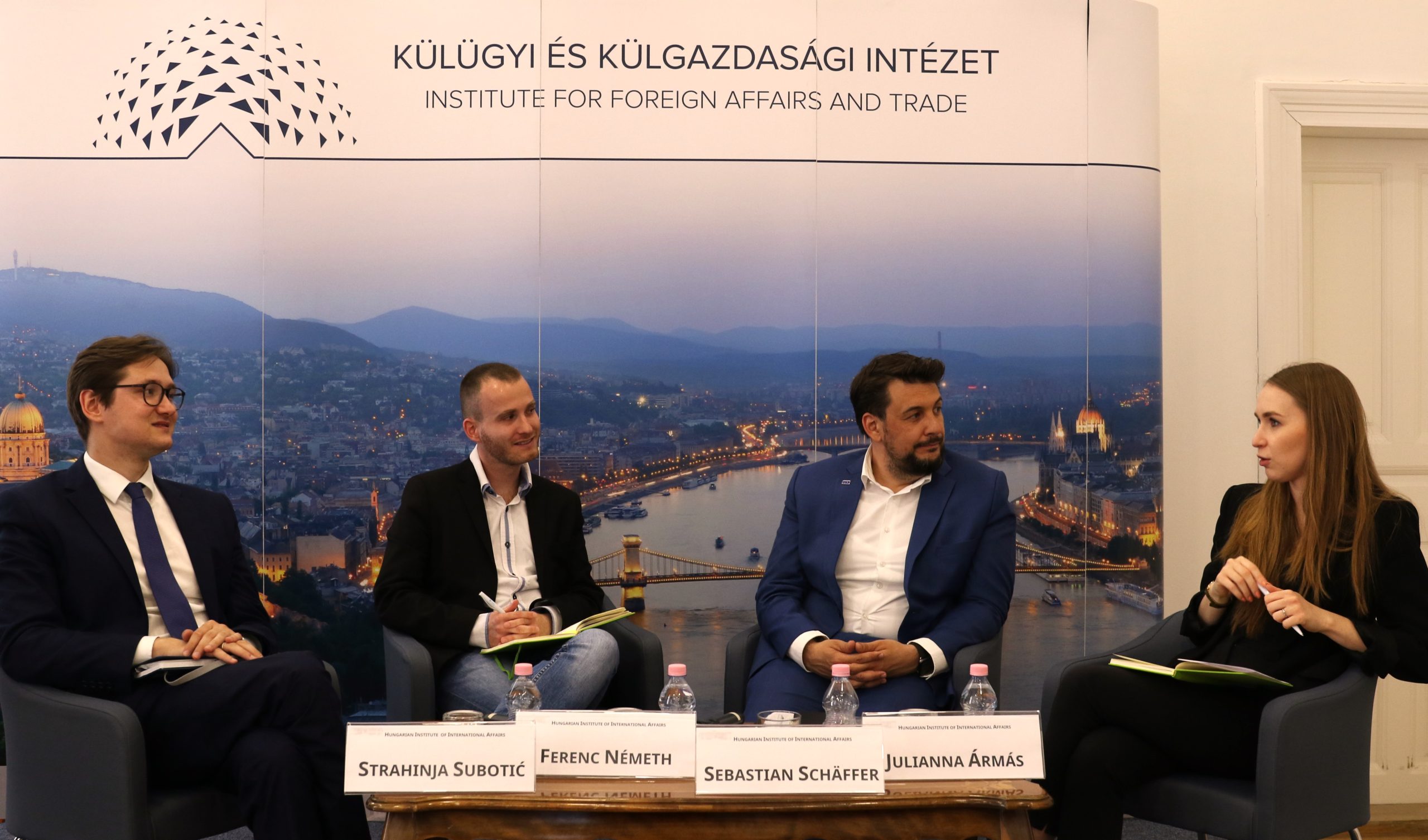On May 23, the Hungarian Institute of International Affairs (HIIA) hosted a roundtable discussion entitled “An Empty Promise to the Western Balkans? 20 years into the Thessaloniki Summit”. The event was organized in conjunction with the Institute of the Danube Region and Central Europe (IDM) which celebrates its 70th anniversary this year. The roundtable included Strahinja Subotić, the Programme Manager and a Senior Researcher of the European Policy Centre, Sebastian Schäffer, the Managing Director of the IDM, and Ferenc Németh, the Program Manager and a Research Fellow of the HIIA. The discussion was moderated by Julianna Ármás, a Research Fellow of the HIIA.
The event began with a keynote speech from Viktor Eszterhai, Research Director of the HIIA. He emphasized the importance of this event for contemporary Hungarian geopolitics. Notably, Mr. Eszterhai highlighted that the forthcoming discussion would enable an enriched understanding of how Western Balkans countries can develop a more fruitful relationship with the European Union (EU). As such, Mr. Eszterhai explained that the roundtable would present useful information on how Hungary could ‘bridge’ the ideological gap between the EU and the Western Balkans region. The speech of the Research Director was followed by preliminary remarks from Julianna Ármás. She subsequently recognized the determinants of this ideological gap and proclaimed that the future of the Western Balkans has been negatively impacted by the ‘false promises’ made at the EU-Western Balkans Summit of Thessaloniki.
After these introductory remarks, the official roundtable discussion began. Throughout it, Ms. Ármás asked the panelists three principal questions. First, how can we evaluate the EU’s activity in the Western Balkans, and can the international organization be considered a credible partner? Second, are there any alternatives to EU enlargement? If so, what does this mean for Ukraine and the prospect of its accession to the EU? Third, are Hungary and Austria valuable players that can help facilitate EU membership for Western Balkan states?
In response to the first question, the panelists agreed that the EU’s activity within the Western Balkans has been ineffective at generating support for the comprehensive domestic reforms that are necessary for accession. As a result, people within the region do not consider the EU to be a credible actor. For Sebastian Schäffer, this is evidenced by the brain drain and mass emigration out of the Western Balkan region. To this point, he noted that although there are faults on both sides, the EU’s credibility will diminish if there are “members outside its club”. His remarks were confirmed by Ferenc Németh, who asserted that the issue of credibility is a ‘catch-22’. However, he articulated, that political elites in the Western Balkans have learned how to utilize the EU narrative to accrue EU funding while having no real intention of initiating reforms that would make accession a real possibility. Building on this, Strahinja Subotić asserted that the EU must provide greater incentives to keep the accession dream alive in the Western Balkans. Reflecting on Serbia’s disappointment with the EU, Mr. Subotić emphatically stated that “the majority of people are hopeless”, and no longer believe that membership is a real possibility.
In response to the second question, opinions on the panel were diverse. Sebastian Schäffer noted that the principles of “reconciliation, rebuilding, and integration” must guide the future of Ukraine and the Western Balkans. For Mr. Schäffer, there are no viable alternatives to the EU, and thus, once the Russia-Ukraine war is over, “concrete work” needs to be done during the post-conflict reconstruction process to create a brighter future for Ukraine. However, he also noted that “Ukraine’s ‘fast-track’ to EU membership” has been received negatively in the Western Balkan states, a reality that he believes will create internal problems for the EU. Conversely, Ferenc Németh asserted that the EU has failed to conduct the type of post-conflict reconstruction operations that would create the pre-conditions for EU membership. As such, in his response, he urged the EU to use ‘small gestures’ outside of the traditional state-accession model to incentivize people in the Western Balkans and Ukraine to pursue reforms conducive to successful EU membership. In parallel, Strahinja Subotić asserted that, “the EU must learn from its past mistakes” in other countries when responding to Ukraine and the Western Balkans. For Mr. Subotić this would entail the development of a reinvigorated approach that is “pro-active and multi-layered”, which accounts for the unique grievances of various populations within these regions.
In response to the last question, the panelists were for the most part in agreement. Hungary and Austria are crucial players in facilitating EU accession for Western Balkan states. Strahinja Subotić and Ferenc Németh both proclaimed that Hungary could play a positive role due to its geographic position and its history with the Western Balkans. To this point, Mr. Subotić claimed that Hungary should be focused on creating a concrete Visegrad policy toward the region while Mr. Németh encouraged the country to recognize the economic issues in the Western Balkans to create greater cross-border cooperation. Alternatively, Sebastian Schäffer contended that Austria is a valuable player which needs to be held accountable for ensuring that nothing close to an EU alternative emerges within the Western Balkans.
Photos by: Hungarian Institute of International Affairs (HIIA)

